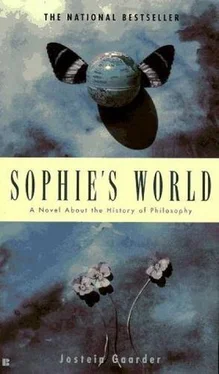Jostein Gaarder - Sophie's World - A Novel About the History of Philosophy
Здесь есть возможность читать онлайн «Jostein Gaarder - Sophie's World - A Novel About the History of Philosophy» весь текст электронной книги совершенно бесплатно (целиком полную версию без сокращений). В некоторых случаях можно слушать аудио, скачать через торрент в формате fb2 и присутствует краткое содержание. ISBN: , Издательство: BERKLEY BOOKS, NEW YORK, Жанр: Философия, на английском языке. Описание произведения, (предисловие) а так же отзывы посетителей доступны на портале библиотеки ЛибКат.
- Название:Sophie's World: A Novel About the History of Philosophy
- Автор:
- Издательство:BERKLEY BOOKS, NEW YORK
- Жанр:
- Год:неизвестен
- ISBN:0-425-15225-1
- Рейтинг книги:4 / 5. Голосов: 1
-
Избранное:Добавить в избранное
- Отзывы:
-
Ваша оценка:
- 80
- 1
- 2
- 3
- 4
- 5
Sophie's World: A Novel About the History of Philosophy: краткое содержание, описание и аннотация
Предлагаем к чтению аннотацию, описание, краткое содержание или предисловие (зависит от того, что написал сам автор книги «Sophie's World: A Novel About the History of Philosophy»). Если вы не нашли необходимую информацию о книге — напишите в комментариях, мы постараемся отыскать её.
Sophie's World: A Novel About the History of Philosophy — читать онлайн бесплатно полную книгу (весь текст) целиком
Ниже представлен текст книги, разбитый по страницам. Система сохранения места последней прочитанной страницы, позволяет с удобством читать онлайн бесплатно книгу «Sophie's World: A Novel About the History of Philosophy», без необходимости каждый раз заново искать на чём Вы остановились. Поставьте закладку, и сможете в любой момент перейти на страницу, на которой закончили чтение.
Интервал:
Закладка:
According to Plato, the human body is composed of three parts: the head, the chest, and the abdomen. For each of these three parts there is a corresponding faculty of the soul. Reason belongs to the head, will belongs to the chest, and appetite belongs to the abdomen. Each of these soul faculties also has an ideal, or “virtue.” Reason aspires to wisdom, Will aspires to courage, and Appetite must be curbed so that temperance can be exercised. Only when the three parts of the body function together as a unity do we get a harmonious or “virtuous” individual. At school, a child must first learn to curb its appetites, then it must develop courage, and finally reason leads to wisdom.
Plato now imagines a state built up exactly like the tripartite human body. Where the body has head, chest, and abdomen, the State has rulers, auxiliaries, and fa-borers (farmers, for example). Here Plato clearly uses Greek medical science as his model. Just as a healthy and harmonious man exercises balance and temperance, so a “virtuous” state is characterized by everyone knowing their place in the overall picture.
Like every aspect of Plato’s philosophy, his political philosophy is characterized by rationalism. The creation of a good state depends on its being governed with reason. Just as the head governs the body, so philosophers must rule society.
Let us attempt a simple illustration of the relationship between the three parts of man and the state:
BODY SOUL VIRTUE STATE
head reason wisdom rulers
chest will courage auxiliaries
abdomen appetite temperance laborers
Plato’s ideal state is not unlike the old Hindu caste system, in .which each and every person has his or her particular function for the good of the whole. Even before Plato’s time the Hindu caste system had the same tripartite division between the auxiliary caste (or priest caste), the warrior caste, and the laborer caste. Nowadays we would perhaps call Plato’s state totalitarian. But it is worth noting that he believed women could govern just as effectively as men for the simple reason that the rulers govern by virtue of their reason. Women, he asserted, have exactly the same powers of reasoning as men, provided they get the same training and are exempt from child rearing and housekeeping. In Plato’s ideal state, rulers and warriors are not allowed family life or private property. The rearing of children is considered too important to be left to the individual and should be the responsibility of the state. (Plato was the first philosopher to advocate state-organized nursery schools and full-time education.)
After a number of significant political setbacks, Plato wrote the tows, in which he described the “constitutional state” as the next-best state. He now reintroduced both private property and family ties. Women’s freedom thus became more restricted. However, he did say that a state that does not educate and train women is like a man who only trains his right arm.
All in all, we can say that Plato had a positive view of women—considering the time he lived in. In the dialogue Symposium, he gives a woman, the legendary priestess Diotima, the honor of having given Socrates his philosophic insight.
So that was Plato, Sophie. His astonishing theories have been discussed—and criticized—for more than two thousand years. The first man to do so was one of the pupils from his own Academy. His name was Aristotle, and he was the third great philosopher from Athens.
I’ll say no more!
While Sophie had been reading about Plato, the sun had risen over the woods to the east. It was peeping over the horizon just as she was reading how one man clambered out of the cave and blinked in the dazzling light outside.
It was almost as if she had herself emerged from an underground cave. Sophie felt that she saw nature in a completely different way after reading about Plato. It was rather like having been color-blind. She had seen some shadows but had not seen the clear ideas.
She was not sure Plato was right in everything he had said about the eternal patterns, but it was a beautiful thought that all living things were imperfect copies of the eternal forms in the world of ideas. Because wasn’t it true that all flowers, trees, human beings, and animals were “imperfect”?
Everything she saw around her was so beautiful and so alive that Sophie had to rub her eyes to really believe it. But nothing she was looking at now would last. And yet—in a hundred years the same flowers and the same animals would be here again. Even if every single flower and every single animal should fade away and be forgotten, there would be something that “recollected” how it all looked.
Sophie gazed out at the world. Suddenly a squirrel ran up the trunk of a pine tree. It circled the trunk a few times and disappeared into the branches.
“I’ve seen you before!” thought Sophie. She realized that maybe it was not the same squirrel that she had seen previously, but she had seen the same “form.” For all she knew, Plato could have been right. Maybe she really had seen the eternal “squirrel” before—in the world of ideas, before her soul had taken residence in a human body.
Could it be true that she had lived before? Had her soul existed before it got a body to move around in? And was it really true that she carried a little golden nugget inside her—a jewel that cannot be corroded by time, a soul that would live on when her own body grew old and died?
The Major’s Cabin
... the girl in the mirror winked with both eyes…
It was only a quarter past seven. There was no need to hurry home. Sophie’s mother always took it easy on Sundays, so she would probably sleep for another two hours.
Should she go a bit farther into the woods and try to find Alberto Knox? And why had the dog snarled at her so viciously?
Sophie got up and began to walk down the path Hermes had taken. She had the brown envelope with the pages on Plato in her hand. Wherever the path diverged she took the wider one.
Birds were chirping everywhere—in the trees and in the air, in bush and thicket. They were busily occupied with their morning pursuits. They knew no difference between weekdays and Sundays. Who had taught them to do all that? Was there a tiny computer inside each one of them, programming them to do certain things?
The path led up over a little hill, then steeply down between tall pine trees. The woods were so dense now that she could only see a few yards between the trees.
Suddenly she caught sight of something glittering between the pine trunks. It must be a little lake. The path went the other way but Sophie picked her way among the trees. Without really knowing why, she let her feet lead her.
The lake was no bigger than a soccer field. Over on the other side she could see a red-painted cabin in a small clearing surrounded by silver birches. A faint wisp of smoke was rising from the chimney.
Sophie went down to the water’s edge. It was very muddy in many places, but then she noticed a rowboat. It was drawn halfway out of the water. There was a pair of oars in it.
Sophie looked around. Whatever she did, it would be impossible to get around the lake to the red cabin without getting her shoes soaked. She went resolutely over to the boat and pushed it into the water. Then she climbed aboard, set the oars in the rowlocks, and rowed across the lake. The boat soon touched the opposite bank. Sophie went ashore and tried to pull the boat up after her. The bank was much steeper here than the opposite bank had been.
She glanced over her shoulder only once before walking up toward the cabin.
She was quite startled at her own boldness. How did she dare do this? She had no idea. It was as if “something” impelled her.
Sophie went up to the door and knocked. She waited a while but nobody answered. She tried the handle cautiously, and the door opened.
Читать дальшеИнтервал:
Закладка:
Похожие книги на «Sophie's World: A Novel About the History of Philosophy»
Представляем Вашему вниманию похожие книги на «Sophie's World: A Novel About the History of Philosophy» списком для выбора. Мы отобрали схожую по названию и смыслу литературу в надежде предоставить читателям больше вариантов отыскать новые, интересные, ещё непрочитанные произведения.
Обсуждение, отзывы о книге «Sophie's World: A Novel About the History of Philosophy» и просто собственные мнения читателей. Оставьте ваши комментарии, напишите, что Вы думаете о произведении, его смысле или главных героях. Укажите что конкретно понравилось, а что нет, и почему Вы так считаете.












